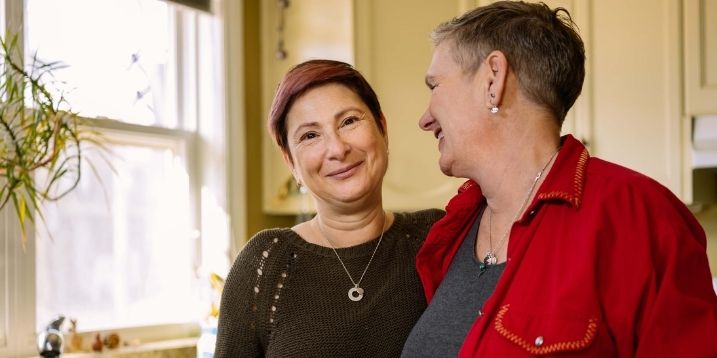
Making decisions about the kind of healthcare you would like to receive in the event of illness or injury is uncomfortable and often confronting. For LGBTIQ+ people, this discomfort can be further exacerbated by past experiences of being subject to discrimination, stigmatisation and harmful assumptions when navigating the healthcare system.
While there is more awareness around the specific healthcare needs of LGBTIQ+ communities, many healthcare providers and healthcare systems still operate from a heteronormative or cisnormative perspective. This means that all patients and their loved ones are assumed to be heterosexual or cisgender (not transgender) unless told otherwise.
When this is the case it is common for healthcare providers to:
- Feel unsure about who has the legal right to make treatment and care decisions when a person is LGBTIQ+.
- Assume that a person’s biological family are the patient’s legal decision-makers, regardless of their chosen family – a term used to describe who an LGBTIQ+ person considers to be their true family and preferred legal decision-makers.
- Struggle to speak to LGBTIQ+ people about advance care planning in an inclusive and affirming way e.g., using inclusive language such as correct pronouns.
One Australian study showed that less than 30% of doctors surveyed were able to identify a same-sex partner as having power under Australian law to make decisions about their partner’s medical treatment1 (Cartwright et al., 2017). This shows the importance of formal advance care planning for LGBTIQ+ people as well as the need more education for health care providers.
There are several more challenges for LGBTIQ+ people engaging in advance care planning. For starters, many simply don’t know about the legal options available to protect their end-of-life wishes and often health care professionals don’t initiate these conversations early enough when they may be relevant.
For the last couple of years, there has been another dimension added to this: COVID. LGBTIQ+ people have higher rates of certain conditions, and research shows many LGBTIQ+ people are at high-risk for Covid related death2. (Rosa et. al., 2020) This leads to additional fear and anxiety, not only about the severity of the virus in the first place, but about the kind of care that will be provided. For LGBTIQ+ people, the current pandemic is yet another example of why it is so important to plan ahead and for healthcare providers to be diligent in having these conversations with patients.
Practical tips for healthcare professionals:
- Assume that any patients you meet could be LGBTIQ+ and that they may have been subject to harm and discrimination within the healthcare system.
- If you are unclear around how the existing law in your state works for LGBTIQ+ folk, educate yourself so that you can provide clear advice.
- Initiate conversations about advance care planning and help LGBTIQ+ people understand their options.
- Advocate for the inclusion of cultural competency training focused on LGBTIQ+ people in healthcare settings.
- While advance care planning can happen at any time, raise awareness about the ways you can support people who are LGBTIQ+ in palliative and end-of-life care contexts by downloading this helpful poster from LGBTIQ+ Health Australia’s palliative care project here.
This content has been supplied by LGBTIQ+ Health Australia. They are engaged in a 3-year Palliative Care Project funded by the Department of Health. To find out more about this work and stay up to date on our upcoming online training for healthcare professionals, head over to the websitehttps://www.lgbtiqhealth.org.au/palliative_care .
1. Cartwright, C., White, B., Willmott, L., Parker, M. & Williams, G. (2017). Australian doctors’ knowledge of and compliance with the law relating to end-of-life decisions: Implications for LGBTI patients. Culture,Health & Sexuality, 20(8), 845–857. https://doi.org/10.1080/13691058.2017.1385854
2. Rosa, W. E., Shook, A. & Acquaviva, K. D. (2020). LGBTQ+ inclusive palliative care in the context of COVID-19: Pragmatic recommendations for clinicians. Journal of Pain and Symptom Management, 60(2), e44–e47. https://doi.org/10.1016/j.jpainsymman.2020.04.155